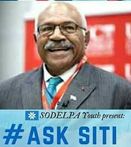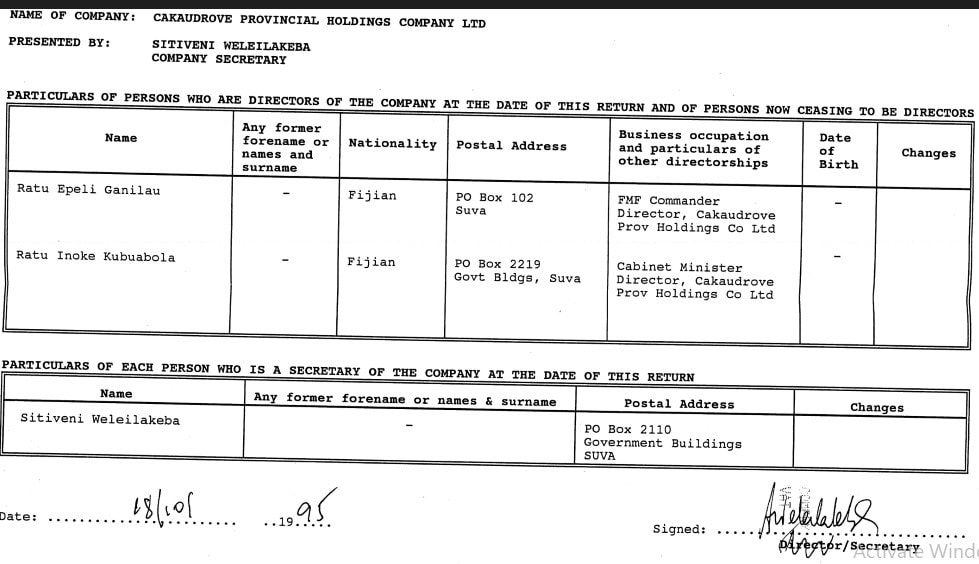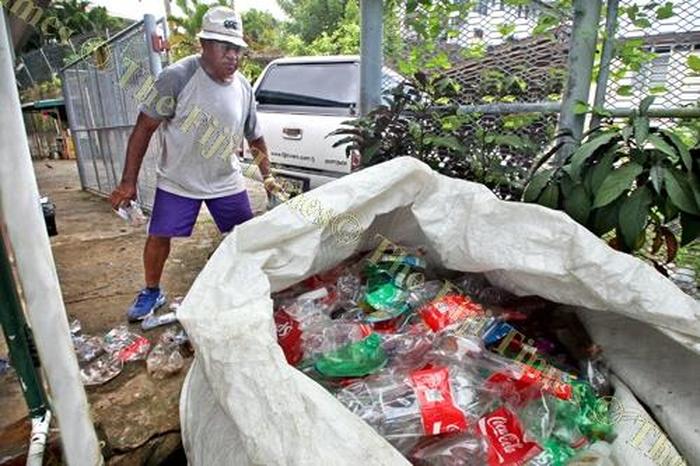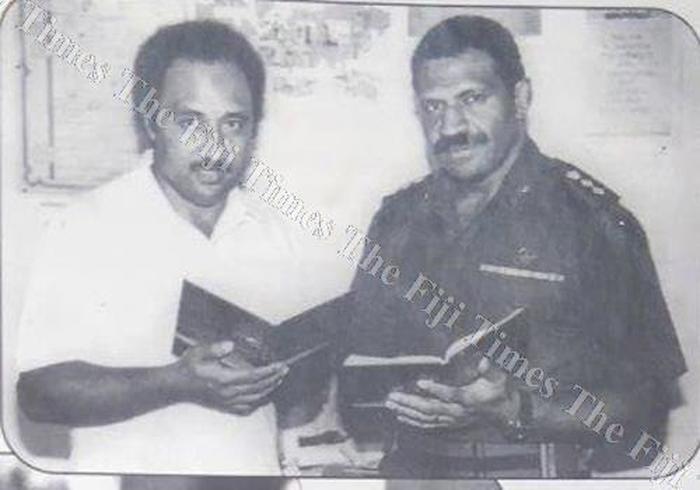His Indo-Fijian victims were made to pick cow dungs with their tongues, forced to stand in sewage pools, and when rape and beatings began in the name of indigenous rights, many Indo-Fijian men and women peed in bottles, especially in rural areas, as they were too scared to go out
SHOCKINGLY, the Fiji Times which did not run the original story about his questionable claims, was quick to give him space to peddle his LIES. He is not entitled to ANY PENSION. He became Prime Minister on the backside of the two racially motivated coups he executed in 1987, and he only became Prime Minister when Mahendra Chaudhry gave FLP MPs votes to him, instead to Rabuka's arch political rival Josevata Kamikamica, who was Ratu Mara's preferred choice |
WHERE THERE'S A WILL
The Fiji Times
Thursday, 16 November 2017
WHEN his pension as a former prime minister was stopped in 2006, Sitiveni Rabuka started selling plastic bottles and coconuts to supplement his family's income.
This habit of the former PM and Social Democratic Liberal Party leader has not stopped because he believes he has shown his children and grandchildren that where there is a will, there is a way.
Apart from supplementing his income, he believes collecting plastic bottles for recycling makes him and his family keep the environment clean.
Mr Rabuka said there was great satisfaction in gainful work and most of the money earned from selling plastic bottles and coconuts was used for everyday expenses.
"I started picking up plastic bottles and my family also helped, after a Suva foreshore clean-up drive was done by some civil servants and youth groups, and I felt it would be both financially rewarding in a small way, and also a civic service in keeping our foreshore, ocean and city clean and tidy," he said.
"Although my pension entitlements have been partially restored, we have continued to collect plastic bottles for recycling."
Mr Rabuka said he started collecting coconuts after receiving a contract to supply the nuts to a food processor.
"I applied and got a contract to sell coconuts to Food Processors at Vatuwaqa, both to earn some money and to help the people of my village and some villages in Natewa earn some money.
"They and I found that it was less tiring and more rewarding to sell nuts than to cut and dry copra, transport it down to Savusavu to sell at Copra Millers factory in Balaga.
"Although I also obtained a copra buying license from the Coconut Industry Development Authority, I stopped buying both raw (Niu droka) and dried copra when my copra dryer was burnt accidentally while being used by a relative in my village.
"While I did these in a casual way, I was also involved in the sale of some of my properties to keep up with my mortgage payments."
Mr Rabuka said he also maintained some international and local speaking engagements, and helped manage an international coconut oil company in Vanuatu.
He resigned from the company after it changed ownership.
He said he could not recall how much he used to earn after selling plastic bottles and coconuts.
"I cannot recall, but I remember that much of it resulted in a trading loss and was reflected in my tax returns over the years.
"I have stopped buying and selling coconuts and copra, but continue to pick and recycle plastic bottles. There is a bag at home that is nearly full for sale at Coca Cola facilities in Kinoya."
Mr Rabuka said he bought two investment properties from the money he made from the sale of his freehold property.
"Helped one church in Pacific Harbour with their hall, one in Lami with the new roof of their church, bought all the pews for a church in Nasinu, financed the logistics in the acquisition of an ambulance for St John Association, support QVS athletics team and QVSOB rugby teams in Suva, Lautoka and Savusavu — so I was not only selling bottles, as some people think.
"I have been receiving a large part of my pension entitlements, and I am grateful to the (then) interim government for restoring it. I was only deprived my full entitlements for about six months.
"While I did not make much from plastic bottles and coconuts, I made my million in my property sales and paid a lot of tax for it."
Mr Rabuka said when one struggles, unity never fails and never says die.
Describing the challenges life brought to him, Mr Rabuka made reference to his favourite poem "IF" by Rudyard Kipling.
"Unity never fails because when I struggled, my family, church, vanua and friends supported me in a big united team," he said.
The Fiji Times
Thursday, 16 November 2017
WHEN his pension as a former prime minister was stopped in 2006, Sitiveni Rabuka started selling plastic bottles and coconuts to supplement his family's income.
This habit of the former PM and Social Democratic Liberal Party leader has not stopped because he believes he has shown his children and grandchildren that where there is a will, there is a way.
Apart from supplementing his income, he believes collecting plastic bottles for recycling makes him and his family keep the environment clean.
Mr Rabuka said there was great satisfaction in gainful work and most of the money earned from selling plastic bottles and coconuts was used for everyday expenses.
"I started picking up plastic bottles and my family also helped, after a Suva foreshore clean-up drive was done by some civil servants and youth groups, and I felt it would be both financially rewarding in a small way, and also a civic service in keeping our foreshore, ocean and city clean and tidy," he said.
"Although my pension entitlements have been partially restored, we have continued to collect plastic bottles for recycling."
Mr Rabuka said he started collecting coconuts after receiving a contract to supply the nuts to a food processor.
"I applied and got a contract to sell coconuts to Food Processors at Vatuwaqa, both to earn some money and to help the people of my village and some villages in Natewa earn some money.
"They and I found that it was less tiring and more rewarding to sell nuts than to cut and dry copra, transport it down to Savusavu to sell at Copra Millers factory in Balaga.
"Although I also obtained a copra buying license from the Coconut Industry Development Authority, I stopped buying both raw (Niu droka) and dried copra when my copra dryer was burnt accidentally while being used by a relative in my village.
"While I did these in a casual way, I was also involved in the sale of some of my properties to keep up with my mortgage payments."
Mr Rabuka said he also maintained some international and local speaking engagements, and helped manage an international coconut oil company in Vanuatu.
He resigned from the company after it changed ownership.
He said he could not recall how much he used to earn after selling plastic bottles and coconuts.
"I cannot recall, but I remember that much of it resulted in a trading loss and was reflected in my tax returns over the years.
"I have stopped buying and selling coconuts and copra, but continue to pick and recycle plastic bottles. There is a bag at home that is nearly full for sale at Coca Cola facilities in Kinoya."
Mr Rabuka said he bought two investment properties from the money he made from the sale of his freehold property.
"Helped one church in Pacific Harbour with their hall, one in Lami with the new roof of their church, bought all the pews for a church in Nasinu, financed the logistics in the acquisition of an ambulance for St John Association, support QVS athletics team and QVSOB rugby teams in Suva, Lautoka and Savusavu — so I was not only selling bottles, as some people think.
"I have been receiving a large part of my pension entitlements, and I am grateful to the (then) interim government for restoring it. I was only deprived my full entitlements for about six months.
"While I did not make much from plastic bottles and coconuts, I made my million in my property sales and paid a lot of tax for it."
Mr Rabuka said when one struggles, unity never fails and never says die.
Describing the challenges life brought to him, Mr Rabuka made reference to his favourite poem "IF" by Rudyard Kipling.
"Unity never fails because when I struggled, my family, church, vanua and friends supported me in a big united team," he said.
Fijileaks:
* Where did a third-ranking army officer get the money from to own
2,000 acre freehold property on Vanua Levu - his Valavala Estate?
* Does he and his wife still own shares in Minson Limited? In 1993 it was revealed that Rabuka and his wife owned shares in Minson after the company was awarded a tender to upgrade the Nadi International Airport
* He is yet to explain why the Ganilau family's Qeleni Holdings was paid $F650,000 to buy off from the family the Prime Minister's (Rabuka's) new residence when the Government valuer had estimated its value at $F465,000? We might recall that Qeleni Holdings owed $716,748 to collapsed National Bank of Fiji. Why Qeleni debt was not deducted when the property was sold at an inflated price for Rabuka to reside in as PM?
* In June 1987 Rabuka and his hoodlums took the then Fiji Sun journalists to the barracks for questioning after the paper published allegations that Rabuka had bought house in a Suva suburb favoured by wealthy Indo-Fijians and expatriates, on a 100% mortgage, from a prominent Alliance politician? Was the Fiji Sun story correct?
* Who borrowed over $100,000 on behalf of the Cakaudrove Provincial Council from NBF and for what, and whether the loan was paid back?
* We may recall that Ratu Epeli Ganilau owed NBF $631,594 and Ratu Inoke Kubuabola owed the bank over $198,000. In 1995 the two were listed as Directors of the Cakaudrove Provincial Holdings Limited. One gave his occupation as FMF Commander; the other as Cabinet Minister:
In April 2007, the Cakaudrove Provincial Holdings [CPHL] Limited took out a mortgage of $662,330 from the Fiji Development Bank and Sitiveni Rabuka is listed as a consultant to the CPHL
The genie will be out of the Bottle during the 2018 election
FIJILEAKS: | Isa, the Fijian people will just have to find out the hard way, AGAIN. We wonder if its GOD or the DEVIL that is twisting his forked tongue? |










